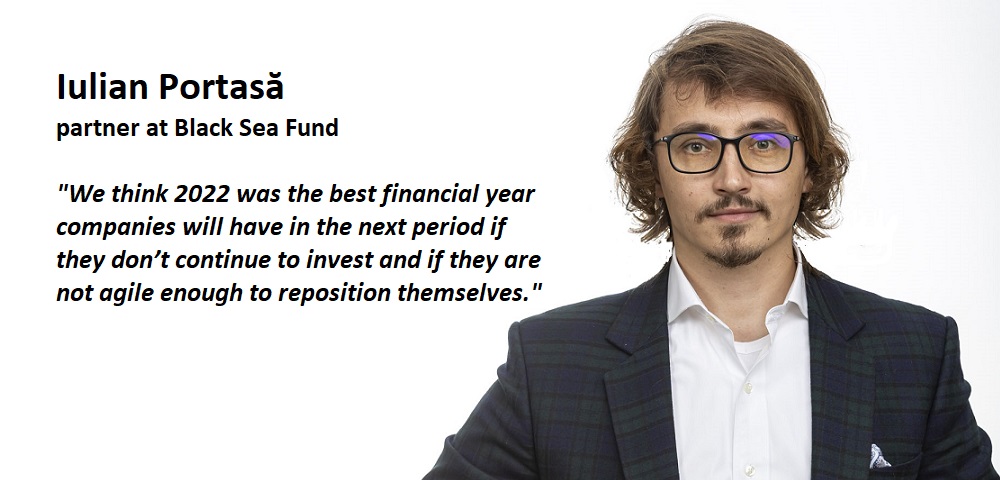Black Sea Fund: Company valuations could fall by 20-30% in 2023. The next period could be below 2022 in terms of financial results.

The least affected companies will be those with predictable businesses, that provide essential services and products or those with a scalable customer base, such as healthcare and IT businesses.
The valuations of Romanian companies could fall by 20-30% this year as a result of fewer investors and deals amid an increasingly difficult economic environment, says Iulian Portasă, partner at Black Sea Fund, an investment fund dedicated to small and medium-sized companies in Romania. He believes that companies with global exposure – such as IT companies – will be less affected by this downturn, as well as those offering essential services where the consumer is not sensitive to price changes, such as healthcare.
Iulian Portasă:
„The value of a company is the result of supply and demand (not ignoring theoretical valuation methods), and the market is currently below the 2022 level.
Companies that may be M&A targets may face a difficult situation in the market as consumers either buy less or prefer cheaper alternatives. Thus, their overall revenues risk falling and their share of lower-margin products increases. Even though production costs (labour, raw materials, utilities) are rising, this does not change the critical need for companies to invest capital (Capex) in the business – both for maintenance and expansion. In the context of higher interest rates, this will most likely be an erosion of profitability and uncertainty of future earnings.
From the perspective of potential buyers, the situation does not look any better – the number of investors seeking exposure to Central and Eastern Europe is declining, and those who have retained their appetite are much more attentive to the predictability of the deals they invest in. This is indirectly impacted by higher financing costs – this leads to a higher cost of capital and a lower price offered.
As a result, discussions with investors no longer start with negotiating EBITDA multiples, but rather with a comprehensive analysis of the company’s cash flow, the stability of its financial position, the level of competition in the industry, and the price elasticity of product demand.
Because of these two causes – declining investor appetite for deals and weaker company results – I expect valuations to fall this year. I believe that the deals that will close will be significantly lower than previously expected: companies’ EBITDA levels will be down 10-20% from last year due to economic conditions putting pressure on costs, and the multiple applied will be more conservative, reflecting reduced buyer appetite. These two factors combined could generate valuations up to 20-30% lower.
IT and healthcare, the least affected industries
I expect the next period to be below 2022 in terms of financial performance, and this period is to be a test of resilience for entrepreneurs. So far, „many have had speed, but have run downhill”, with the advantage of growth inertia and cheap finance.
But this period certainly creates growth opportunities. Companies with resilient demand and/or those with a solid financial structure can capture the momentum in the market or even take advantage of it to strengthen their position through acquisitions and mergers.
I expect scalable businesses with global exposure and those in defensive sectors to be the winners during this period.
For the first category, scalable companies, I am mainly referring to the IT sector, especially the area of value-added products and services. In this industry, we are talking about international customers but also products that differentiate themselves and address a constant need for which the replacement cost is high (ERP software, for example).
For the second category, defensive sectors, healthcare is an area where people are still investing and is not among the first to be eliminated from the shopping basket.
Instead, the areas and companies that will be hit hardest are those that produce non-priority goods, those where the consumer is attentive and price-sensitive and for which they have a wide choice to choose from, so they can switch to cheaper alternatives. For example, I refer to HoReCa, food delivery and other consumer goods. However, there will be winners here too – most likely private label producers, a ‘refuge’ product category in times of crisis, but also those who can adapt quickly to economic change.
We think 2022 was the best financial year companies will have in the next period if they don’t continue to invest and if they are not agile enough to reposition themselves.
Romania is in an ideal position in this economic turmoil to capture high investment volumes in the coming years. The changing strategies of the big players to move the production closer to key markets transforms the Central and Eastern European region in an ideal space to develop industrially and to become a production hub for European consumption. The absorption of funds from the National Recovery and Resilience Plan will likely accelerate this development as long as it is done quickly and efficiently.„
_______________
Iulian Portasă has over ten years of transaction experience in technology, energy and gas, healthcare and manufacturing. Since 2019 he has been part of the Black Sea Fund (BSF) team. Since 2021, he has been a partner of the fund, and since 2022 a member of the BSF Investment Committee.
Dariusz Mazurkiewicz – CEO at BLIK Polish Payment Standard
Banking 4.0 – „how was the experience for you”
„To be honest I think that Sinaia, your conference, is much better then Davos.”
Many more interesting quotes in the video below:










